Module 1 Unit 1 Trees (Reading I)
文档属性
| 名称 | Module 1 Unit 1 Trees (Reading I) |

|
|
| 格式 | zip | ||
| 文件大小 | 51.6MB | ||
| 资源类型 | 教案 | ||
| 版本资源 | 牛津上海版(试用本) | ||
| 科目 | 英语 | ||
| 更新时间 | 2013-03-04 20:56:41 | ||
图片预览

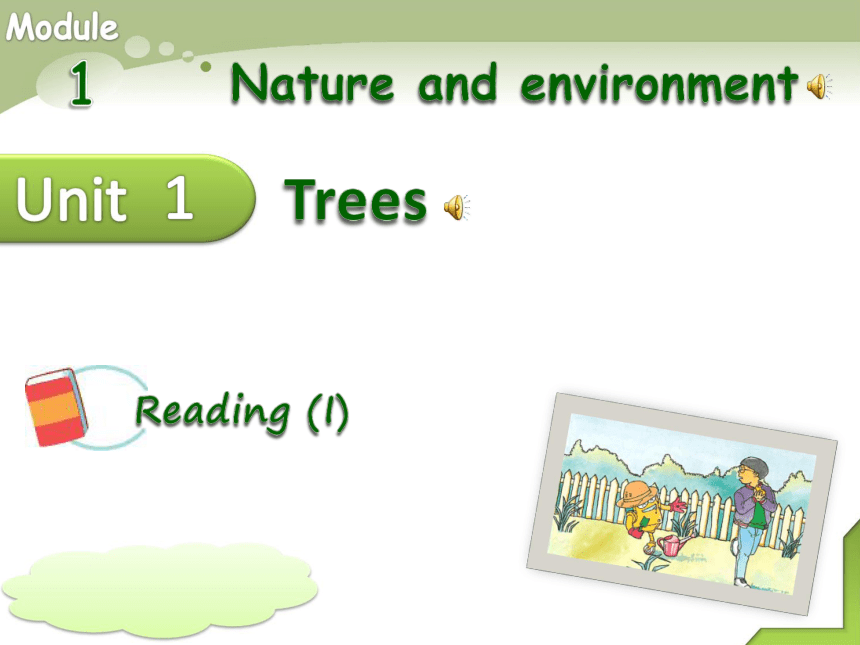
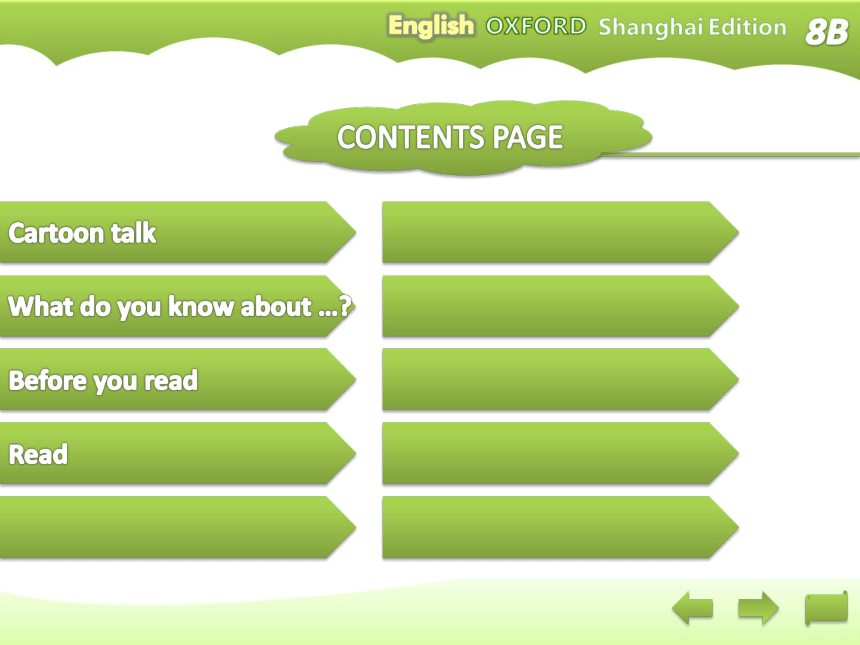

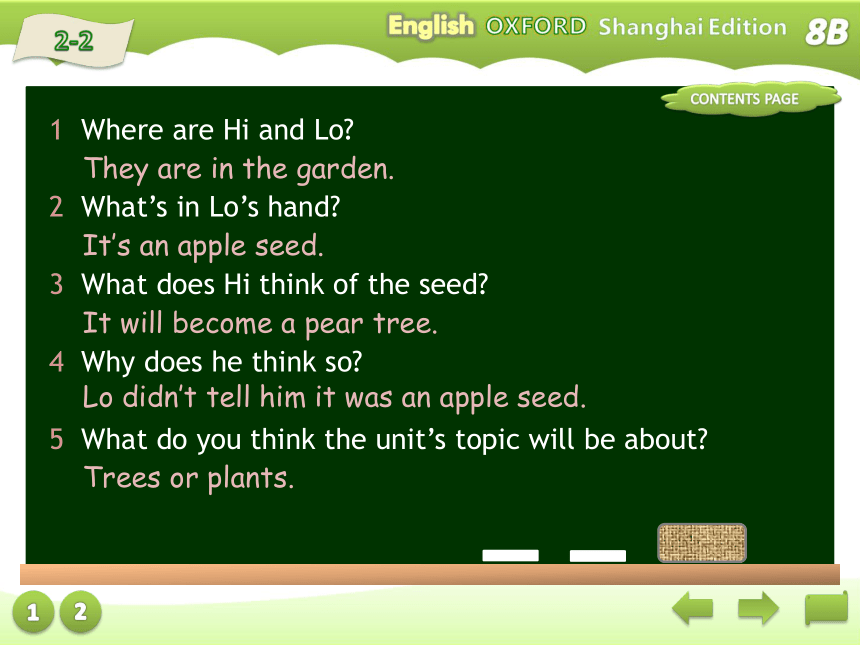

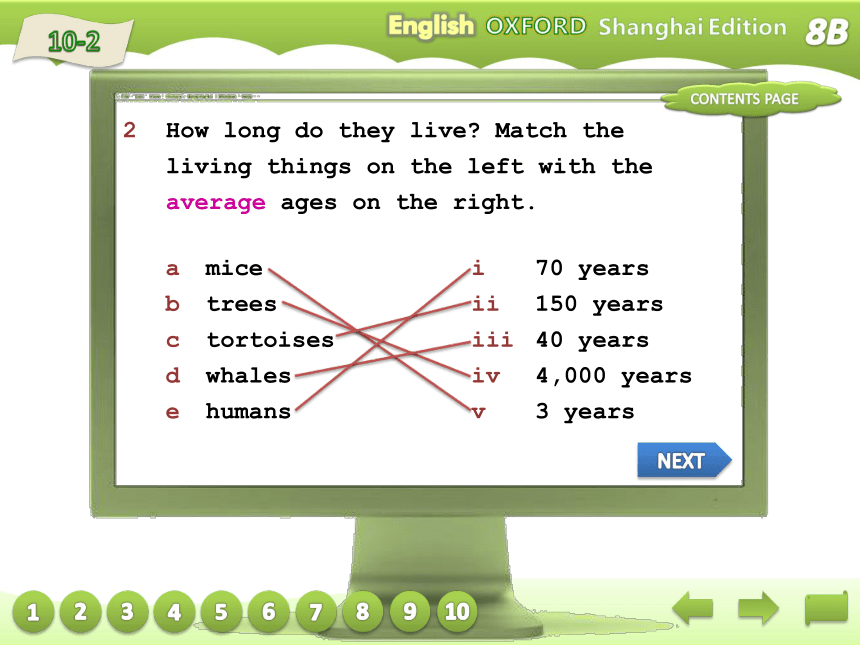
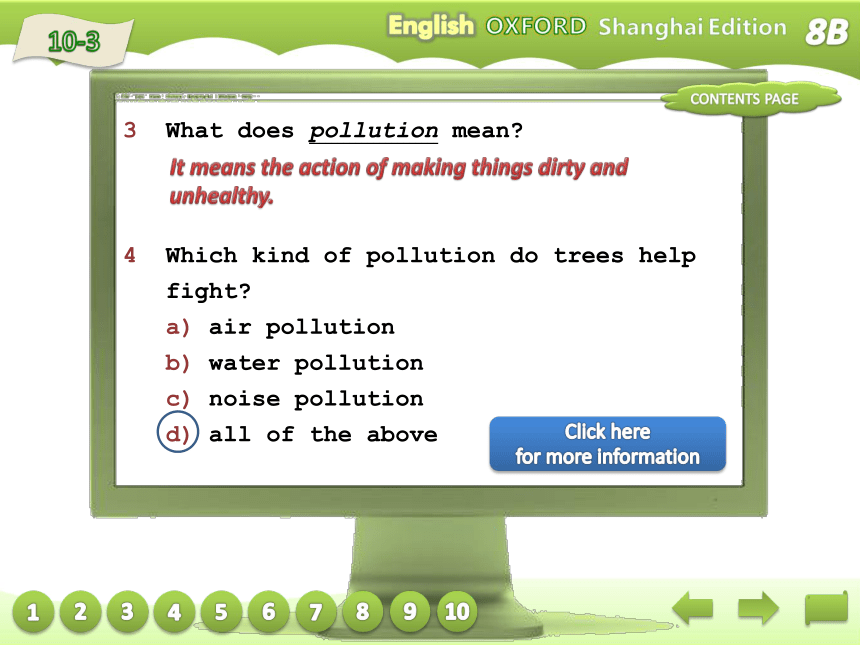

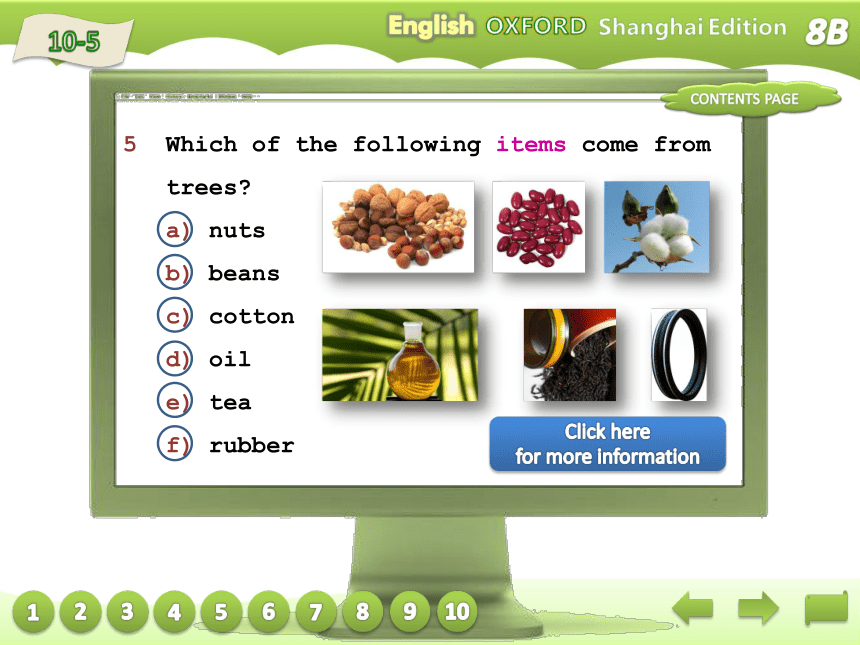
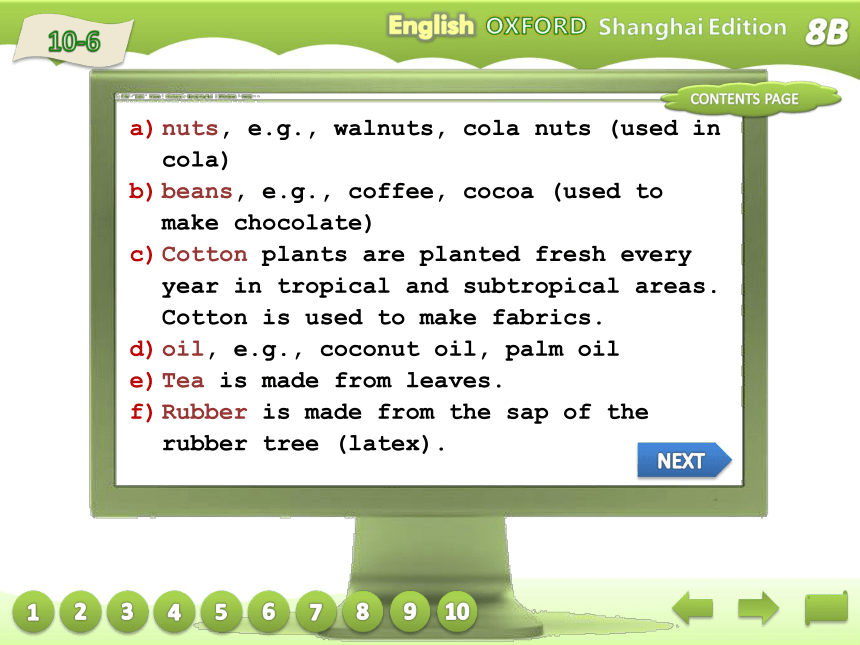
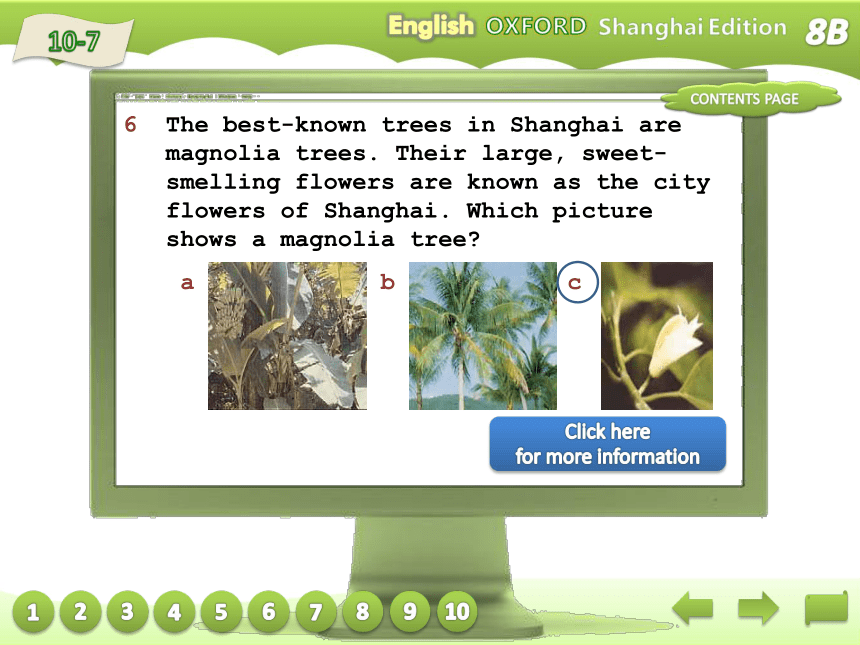
文档简介
课件55张PPT。1Nature and environmentTreesReading (I)1Cartoon talkWhat do you know about …?Before you readReadCONTENTS PAGECartoon talk2-1If I plant this seed in the ground, will it become a pear tree, Hi?Yes, Lo.That’s strange. It’s an apple seed.122-212Where are Hi and Lo?
What’s in Lo’s hand?
What does Hi think of the seed?
Why does he think so?
What do you think the unit’s topic will be about?They are in the garden.It’s an apple seed.It will become a pear tree.Lo didn’t tell him it was an apple seed.Trees or plants.What do you know about …? Before you read the interview, try this online quiz.Match the pictures with the words.( ) 1 whales
( ) 2 humans
( ) 3 trees
( ) 4 mice
( ) 5 tortoises
cebadNEXT10-112345678910How long do they live? Match the living things on the left with the average ages on the right.NEXT10-212345678910What does pollution mean?It means the action of making things dirty and unhealthy.Which kind of pollution do trees help fight?
air pollution
water pollution
noise pollution
all of the aboveClick here for more information10-312345678910NEXTAir pollution: The leaves of trees remove dangerous chemicals and dirt from the air and produce oxygen.
Water pollution: Trees around reservoirs help keep the water clean by removing dust and dirt from the air, and their roots prevent the soil from being washed into the water.
Noise pollution: Trees reduce the noise made by traffic.10-412345678910Which of the following items come from trees?
nuts
beans
cotton
oil
tea
rubberClick here for more information10-512345678910nuts, e.g., walnuts, cola nuts (used in cola)
beans, e.g., coffee, cocoa (used to make chocolate)
Cotton plants are planted fresh every year in tropical and subtropical areas. Cotton is used to make fabrics.
oil, e.g., coconut oil, palm oil
Tea is made from leaves.
Rubber is made from the sap of the rubber tree (latex).NEXT10-612345678910The best-known trees in Shanghai are magnolia trees. Their large, sweet-smelling flowers are known as the city flowers of Shanghai. Which picture shows a magnolia tree? a b cClick here for more information10-712345678910The banana tree (a) is usually called a tree, but it is not really one because its trunk is not made of wood. It produces fruit and its leaves can be used as roofing material.10-81234567891010-9There are many different kinds of palm trees (b). The coconut palm produces coconuts whose outside shell (the husk) can be made into ropes or burned for firewood. The milk can be drunk and the flesh of the coconut can be eaten. Oil pressed from the flesh is used both for cooking and in skin creams. The leaves are used to make brooms.1234567891010-10Magnolia trees (c) are small to medium-sized trees noted for their large, showy blossoms in early spring, and large leaves.12345678910Before you readA Before you read the interview, look at the title, the introduction and the pictures.Judy is collecting some facts for a class project on pollution. She is interviewing Doctor Ray, a scientist, about trees.3-1123B Do not read the whole interview yet and decide whether the following statements are T (true) or F (false).The pollution fighters are probably scientists. T / F
Many useful products come from trees. T / F
Trees are natural air conditioners. T / F
Trees can pass information to one another. T / F1233-2C Scan the interview and check if you have got the correct choices about the following statements.The pollution fighters are probably scientists. T / F
Many useful products come from trees. T / F
Trees are natural air conditioners. T / F
Trees can pass information to one another. T / F1233-3ReadJudy is collecting some facts for a class project on pollution. She is interviewing Doctor Ray, a scientist, about trees.5-112345JUDY Why are you so interested in trees, Doctor Ray?
DR RAY They’re the biggest and oldest living things on the Earth, Judy.
JUDY Yes, but what good are trees? They make streets more beautiful and less noisy, but what else can they do?
DR RAY Well, the wood in your pencil, the rubber on the end of your pencil, the paper in your notebook and the fruit in your bowl all come from trees! And, I suppose you also enjoy breathing pure, cool air.
JUDY Of course.5-212345DR RAY Then you must thank trees for that too. They take harmful gases from the air, and release oxygen back into the air. How many people are there in your class, Judy?
JUDY Forty-six.
DR RAY Well, one and a half hectares of trees could produce enough oxygen to keep your whole class alive and healthy for a whole year.
JUDY That’s wonderful!
DR RAY Trees cool the air as well as clean it. They are natural air conditioners. Three trees can do the job of 15 air conditioners running almost all day.5-312345JUDY You certainly know a lot about trees, Doctor Ray.
DR RAY Thank you, Judy, but I don’t, really. Scientists are only now beginning to understand them. For example, when insects attack a tree, it can warn its neighbours. The trees can then protect themselves by producing a chemical that makes their leaves taste nasty. And some trees can join their roots together underground, and pass food and water to each other. Trees are communicating with one another, but we don’t know how.5-412345JUDY Are trees in danger?
DR RAY In great danger. We cut down and burn millions every year, but we replace hardly any of them. We are destroying our best fighters against pollution.
5-512345ConsolidationWorkbook 8B, page 1.
average/'?v?r??/adj.around a usual or ordinary level or standardThe average age of the boys in this grade is ten.
He drives at an average speed of 100 miles per hour.item/'a?t?m/n.a single article or objectThe police examined several items of clothing.
Do you know if they like this new item?fact/f?kt/n.something that you know has happened or is trueIt is a fact that smoking is a danger to health.
Before we make detailed plans, we need some more facts and figures.scientist/'sa??nt?st/n.a person who studies science or works with scienceThat boy’s ambition is to be a scientist.
When can scientists conquer cancer?fighter/'fa?t?(r)/n.a person who fightsThe man is a real fighter. He never gives up.
As soon as I walked into the living room, I saw a picture of fighters on the wall.product/'pr?d?kt/n.something that people make or grow to sellMy bike is a home product.
Coffee is Brazil’s main product.natural/'n??r?l/adj.produced by/concerned with natureMen often have to face natural disasters.
It is natural that such a hard-working student should pass the exam.air conditioner/'e? k?n'd???n?(r)/n.a piece of electric equip-ment that makes the air inside a building, room, or vehicle colder or warmerThis new style of air conditioner is noiseless.
An Air conditioner makes us feel more comfortable in summer and winter.interested/'?ntr?st?d/adj.wanting to know more about something or somebodyI tried to tell him about it, but he was not interested at all.(be) interested inWhy are you so interested in football?notebook/'n??tb?k/n.a small book where you write things that you want to rememberI’ve written down all the new words I don’t know in the notebook.
We don’t know where he put his notebook.suppose/s?'p??z/v.think something to be trueScientists supposed that large dinosaurs lived in swamps.
I suppose prices will go down.breathe/bri:e/v.take in or let our air through your nose and mouthThe air was so cold that we could hardly breathe.
Most people don’t realize that they are breathing polluted air.pure/pj??(r)/adj.clean and not containing any harmful substancesThe air was sweet and pure.
The air by the sea is purer and healthier.gas/ɡ?s/n.anything that is like airThere are several kinds of gas in the air.
When we boil water, it turns into gas and we call it steam.release/r?'li:s/v.let out; let something/ somebody go free Trees take in carbon dioxide and release oxygen into the air.
Four prisoners were released.oxygen/'?ks???n/n.a gas present in air and essential for lifeThere is a shortage of oxygen at the top of the mountain.
No living things can live without oxygen.hectare/'hekte?(r)/n.a unit for measuring an area of landOur school covers an area of 73 hectares.
1 hectare equals to 10,000 square metres.produce/pr?'dju:s/v.make or grow somethingGas can be produced from coal.
He raised enough money to produce a new film.alive/?'la?v/adj.living; not deadAre your grandparents still alive?
Only a little boy was alive in the air crash.as well asalso; tooThe captain, as well as the passengers, was saved.
He grows flowers as well as vegetables.warn/w?:n/v.tell somebody about danger or about something bad that may happenI warned him not to go too close to the fireplace.
I warn you that I’m almost losing patience.protect/pr?'tekt/v.keep somebody or something safeWear a hat to protect your head against the sun.
Parents try to protect their children from danger.chemical/'kem?kl/n.something (i.e., a solid, liquid or gas) used in chemistryHe is experimenting with a new chemical.
This kind of chemical is bad for our health.nasty/'nɑ:st?/adj.unpleasant; not niceThere’s a nasty smell coming from that sewer.
The coffee has a nasty taste.join/???n/v.bring or fix one thing to anotherThe Channel Tunnel joins the UK to France.
Please join the two pieces of wood together.communicate/k?'mju:n?ke?t/v.talk or write to somebody; give or receive informationYoung people like to communicate by e-mail and telephone.
We learn a foreign language in order to better communicate with others.one anothereach otherYou have to help one another to win the game.
Our teacher tells us not to talk to one another in class.pron.burn/b?:n/v.harm or destroy somebody or something with fire or heatTen people were burnt to death in the hotel fire.
The hill fire has burnt all the trees.replace/r?'ple?s/v.take the place of somebody or somethingCan anything replace a mother’s love and care?
Electric lights have replaced candles.hardly/'hɑ:dl?/adv.almost notI could hardly understand what he said.
It was so dark that I could hardly see.destroy/d?'str??/v.break something completely so that you cannot use it again or so that it is goneThe fire destroyed all my books.
The heavy rain destroyed all hope of a picnic.
What’s in Lo’s hand?
What does Hi think of the seed?
Why does he think so?
What do you think the unit’s topic will be about?They are in the garden.It’s an apple seed.It will become a pear tree.Lo didn’t tell him it was an apple seed.Trees or plants.What do you know about …? Before you read the interview, try this online quiz.Match the pictures with the words.( ) 1 whales
( ) 2 humans
( ) 3 trees
( ) 4 mice
( ) 5 tortoises
cebadNEXT10-112345678910How long do they live? Match the living things on the left with the average ages on the right.NEXT10-212345678910What does pollution mean?It means the action of making things dirty and unhealthy.Which kind of pollution do trees help fight?
air pollution
water pollution
noise pollution
all of the aboveClick here for more information10-312345678910NEXTAir pollution: The leaves of trees remove dangerous chemicals and dirt from the air and produce oxygen.
Water pollution: Trees around reservoirs help keep the water clean by removing dust and dirt from the air, and their roots prevent the soil from being washed into the water.
Noise pollution: Trees reduce the noise made by traffic.10-412345678910Which of the following items come from trees?
nuts
beans
cotton
oil
tea
rubberClick here for more information10-512345678910nuts, e.g., walnuts, cola nuts (used in cola)
beans, e.g., coffee, cocoa (used to make chocolate)
Cotton plants are planted fresh every year in tropical and subtropical areas. Cotton is used to make fabrics.
oil, e.g., coconut oil, palm oil
Tea is made from leaves.
Rubber is made from the sap of the rubber tree (latex).NEXT10-612345678910The best-known trees in Shanghai are magnolia trees. Their large, sweet-smelling flowers are known as the city flowers of Shanghai. Which picture shows a magnolia tree? a b cClick here for more information10-712345678910The banana tree (a) is usually called a tree, but it is not really one because its trunk is not made of wood. It produces fruit and its leaves can be used as roofing material.10-81234567891010-9There are many different kinds of palm trees (b). The coconut palm produces coconuts whose outside shell (the husk) can be made into ropes or burned for firewood. The milk can be drunk and the flesh of the coconut can be eaten. Oil pressed from the flesh is used both for cooking and in skin creams. The leaves are used to make brooms.1234567891010-10Magnolia trees (c) are small to medium-sized trees noted for their large, showy blossoms in early spring, and large leaves.12345678910Before you readA Before you read the interview, look at the title, the introduction and the pictures.Judy is collecting some facts for a class project on pollution. She is interviewing Doctor Ray, a scientist, about trees.3-1123B Do not read the whole interview yet and decide whether the following statements are T (true) or F (false).The pollution fighters are probably scientists. T / F
Many useful products come from trees. T / F
Trees are natural air conditioners. T / F
Trees can pass information to one another. T / F1233-2C Scan the interview and check if you have got the correct choices about the following statements.The pollution fighters are probably scientists. T / F
Many useful products come from trees. T / F
Trees are natural air conditioners. T / F
Trees can pass information to one another. T / F1233-3ReadJudy is collecting some facts for a class project on pollution. She is interviewing Doctor Ray, a scientist, about trees.5-112345JUDY Why are you so interested in trees, Doctor Ray?
DR RAY They’re the biggest and oldest living things on the Earth, Judy.
JUDY Yes, but what good are trees? They make streets more beautiful and less noisy, but what else can they do?
DR RAY Well, the wood in your pencil, the rubber on the end of your pencil, the paper in your notebook and the fruit in your bowl all come from trees! And, I suppose you also enjoy breathing pure, cool air.
JUDY Of course.5-212345DR RAY Then you must thank trees for that too. They take harmful gases from the air, and release oxygen back into the air. How many people are there in your class, Judy?
JUDY Forty-six.
DR RAY Well, one and a half hectares of trees could produce enough oxygen to keep your whole class alive and healthy for a whole year.
JUDY That’s wonderful!
DR RAY Trees cool the air as well as clean it. They are natural air conditioners. Three trees can do the job of 15 air conditioners running almost all day.5-312345JUDY You certainly know a lot about trees, Doctor Ray.
DR RAY Thank you, Judy, but I don’t, really. Scientists are only now beginning to understand them. For example, when insects attack a tree, it can warn its neighbours. The trees can then protect themselves by producing a chemical that makes their leaves taste nasty. And some trees can join their roots together underground, and pass food and water to each other. Trees are communicating with one another, but we don’t know how.5-412345JUDY Are trees in danger?
DR RAY In great danger. We cut down and burn millions every year, but we replace hardly any of them. We are destroying our best fighters against pollution.
5-512345ConsolidationWorkbook 8B, page 1.
average/'?v?r??/adj.around a usual or ordinary level or standardThe average age of the boys in this grade is ten.
He drives at an average speed of 100 miles per hour.item/'a?t?m/n.a single article or objectThe police examined several items of clothing.
Do you know if they like this new item?fact/f?kt/n.something that you know has happened or is trueIt is a fact that smoking is a danger to health.
Before we make detailed plans, we need some more facts and figures.scientist/'sa??nt?st/n.a person who studies science or works with scienceThat boy’s ambition is to be a scientist.
When can scientists conquer cancer?fighter/'fa?t?(r)/n.a person who fightsThe man is a real fighter. He never gives up.
As soon as I walked into the living room, I saw a picture of fighters on the wall.product/'pr?d?kt/n.something that people make or grow to sellMy bike is a home product.
Coffee is Brazil’s main product.natural/'n??r?l/adj.produced by/concerned with natureMen often have to face natural disasters.
It is natural that such a hard-working student should pass the exam.air conditioner/'e? k?n'd???n?(r)/n.a piece of electric equip-ment that makes the air inside a building, room, or vehicle colder or warmerThis new style of air conditioner is noiseless.
An Air conditioner makes us feel more comfortable in summer and winter.interested/'?ntr?st?d/adj.wanting to know more about something or somebodyI tried to tell him about it, but he was not interested at all.(be) interested inWhy are you so interested in football?notebook/'n??tb?k/n.a small book where you write things that you want to rememberI’ve written down all the new words I don’t know in the notebook.
We don’t know where he put his notebook.suppose/s?'p??z/v.think something to be trueScientists supposed that large dinosaurs lived in swamps.
I suppose prices will go down.breathe/bri:e/v.take in or let our air through your nose and mouthThe air was so cold that we could hardly breathe.
Most people don’t realize that they are breathing polluted air.pure/pj??(r)/adj.clean and not containing any harmful substancesThe air was sweet and pure.
The air by the sea is purer and healthier.gas/ɡ?s/n.anything that is like airThere are several kinds of gas in the air.
When we boil water, it turns into gas and we call it steam.release/r?'li:s/v.let out; let something/ somebody go free Trees take in carbon dioxide and release oxygen into the air.
Four prisoners were released.oxygen/'?ks???n/n.a gas present in air and essential for lifeThere is a shortage of oxygen at the top of the mountain.
No living things can live without oxygen.hectare/'hekte?(r)/n.a unit for measuring an area of landOur school covers an area of 73 hectares.
1 hectare equals to 10,000 square metres.produce/pr?'dju:s/v.make or grow somethingGas can be produced from coal.
He raised enough money to produce a new film.alive/?'la?v/adj.living; not deadAre your grandparents still alive?
Only a little boy was alive in the air crash.as well asalso; tooThe captain, as well as the passengers, was saved.
He grows flowers as well as vegetables.warn/w?:n/v.tell somebody about danger or about something bad that may happenI warned him not to go too close to the fireplace.
I warn you that I’m almost losing patience.protect/pr?'tekt/v.keep somebody or something safeWear a hat to protect your head against the sun.
Parents try to protect their children from danger.chemical/'kem?kl/n.something (i.e., a solid, liquid or gas) used in chemistryHe is experimenting with a new chemical.
This kind of chemical is bad for our health.nasty/'nɑ:st?/adj.unpleasant; not niceThere’s a nasty smell coming from that sewer.
The coffee has a nasty taste.join/???n/v.bring or fix one thing to anotherThe Channel Tunnel joins the UK to France.
Please join the two pieces of wood together.communicate/k?'mju:n?ke?t/v.talk or write to somebody; give or receive informationYoung people like to communicate by e-mail and telephone.
We learn a foreign language in order to better communicate with others.one anothereach otherYou have to help one another to win the game.
Our teacher tells us not to talk to one another in class.pron.burn/b?:n/v.harm or destroy somebody or something with fire or heatTen people were burnt to death in the hotel fire.
The hill fire has burnt all the trees.replace/r?'ple?s/v.take the place of somebody or somethingCan anything replace a mother’s love and care?
Electric lights have replaced candles.hardly/'hɑ:dl?/adv.almost notI could hardly understand what he said.
It was so dark that I could hardly see.destroy/d?'str??/v.break something completely so that you cannot use it again or so that it is goneThe fire destroyed all my books.
The heavy rain destroyed all hope of a picnic.
